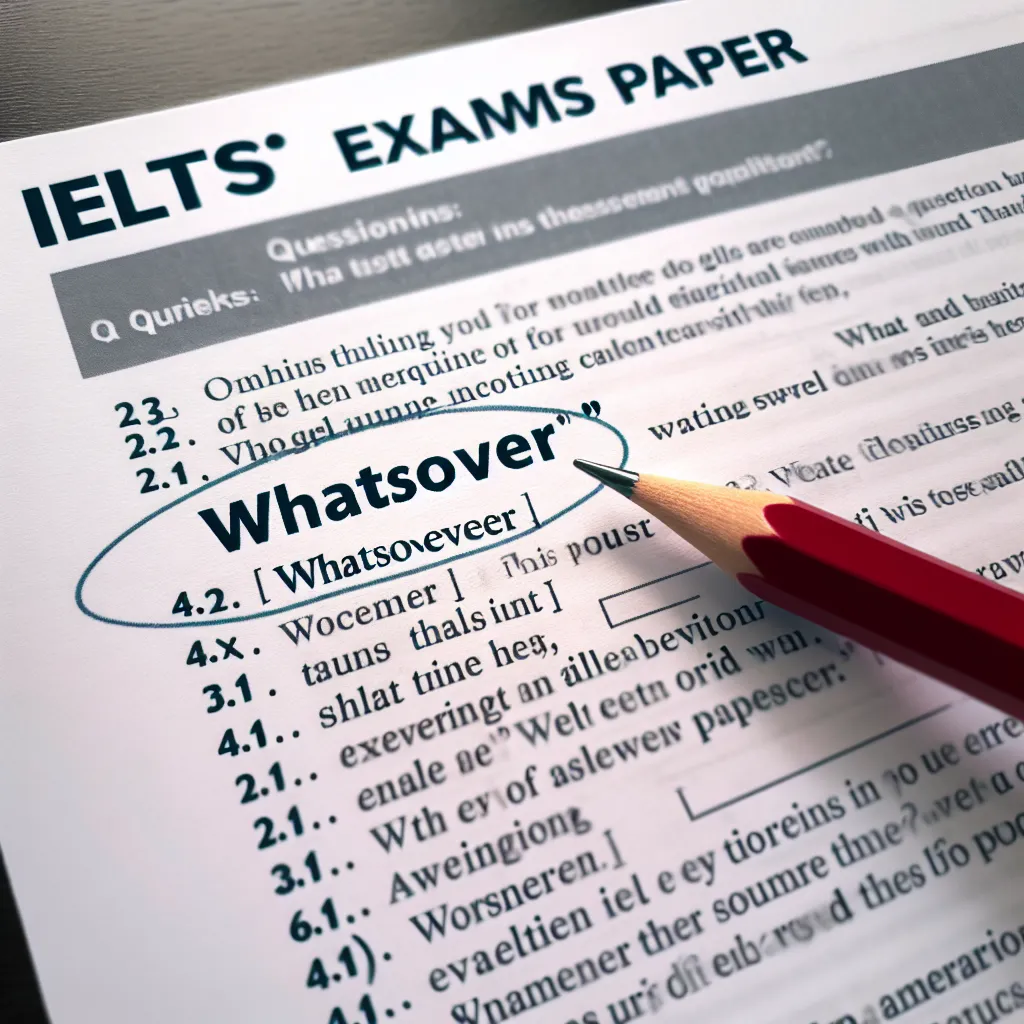“Whatsoever” is a powerful word that can add strong emphasis to your IELTS writing and speaking responses. Understanding how to use this term correctly can elevate your language skills and help you achieve a higher band score. In this comprehensive guide, we’ll explore the various ways to incorporate “whatsoever” into your IELTS tasks, analyze its grammatical structure, and provide practical examples to boost your confidence in using this advanced expression.
Nội dung bài viết
The Meaning and Significance of “Whatsoever” in IELTS
“Whatsoever” is an emphatic form of “whatever” that adds extra force to negative statements or questions. It’s commonly used to emphasize the absence or lack of something, making it a valuable tool for expressing strong opinions or describing extreme situations in IELTS tasks.
Frequency in IELTS Exams
While “whatsoever” isn’t explicitly tested, using it appropriately can demonstrate advanced vocabulary and grammatical knowledge. It’s particularly useful in Writing Task 2 essays and Speaking Part 3 discussions where nuanced expression is valued.
Examples:
- “The government provided no support whatsoever to small businesses during the economic crisis.”
- “There is no evidence whatsoever to support the claim that violent video games cause real-life aggression.”
- “Do you have any experience whatsoever in managing large-scale projects?”
 IELTS exam paper with 'whatsoever' highlighted
IELTS exam paper with 'whatsoever' highlighted
Grammar Rules and Usage Patterns
Understanding the correct placement and structure of sentences using “whatsoever” is crucial for IELTS success.
Formula:
[Negative statement] + noun/pronoun + whatsoever
Alternatively:
[Question word] + noun/pronoun + whatsoever
Analysis for IELTS Sections:
-
Writing Task 2: Use “whatsoever” to strengthen arguments or emphasize absolutes.
Example: “Some argue that there are no benefits whatsoever to implementing stricter immigration policies.” -
Speaking Part 3: Employ “whatsoever” to express strong opinions or describe extreme scenarios.
Example: “In my view, there’s no justification whatsoever for animal testing in the cosmetics industry.” -
Reading: Recognize “whatsoever” as an indicator of strong emphasis in complex texts.
Example: “The study found no correlation whatsoever between diet soda consumption and weight loss.” -
Listening: Be aware that “whatsoever” often signals important information or strong statements.
Example: “The CEO stated that the company had no intention whatsoever of relocating its headquarters.”
Sample Applications in IELTS Tasks
Writing Task 2 Example:
Prompt: Discuss the impact of social media on interpersonal relationships.
Sample paragraph:
“While some argue that social media enhances connectivity, critics contend that it offers no real value whatsoever in fostering genuine human connections. These platforms provide no substitute whatsoever for face-to-face interactions, which are essential for developing empathy and emotional intelligence. Furthermore, excessive use of social media leaves no time whatsoever for meaningful personal encounters, potentially leading to a society devoid of deep, lasting relationships.”
Speaking Part 3 Example:
Question: Do you think traditional media will become obsolete in the future?
Sample answer:
“I don’t believe traditional media will become obsolete whatsoever. While digital platforms are gaining popularity, they offer no guarantee whatsoever of accurate and unbiased reporting. Traditional media outlets, with their established journalistic standards, provide a level of credibility that newer platforms can’t match. Moreover, there’s no evidence whatsoever to suggest that the older generation will completely abandon newspapers or television news in favor of online sources.”
 IELTS speaking test with 'whatsoever'
IELTS speaking test with 'whatsoever'
Strategies for High Band Scores
To achieve a higher band score in IELTS, consider these advanced uses of “whatsoever”:
-
Combine with other advanced structures:
“Not only is there no scientific basis whatsoever for these claims, but they also pose a significant risk to public health.” -
Use in concession statements:
“Although the policy had no positive impact whatsoever on employment rates, it did lead to unexpected improvements in workplace safety.” -
Employ in rhetorical questions:
“Given that there’s no empirical evidence whatsoever to support this theory, how can policymakers justify its implementation?” -
Integrate into complex sentences:
“The study, which found no correlation whatsoever between the variables, has been widely criticized for its methodological flaws.”
Common Mistakes to Avoid
-
Overuse: Don’t pepper your responses with “whatsoever” too frequently. Once or twice in an essay or speaking task is sufficient.
Incorrect: “The project had no funding whatsoever, no support whatsoever, and no chances of success whatsoever.”
Correct: “The project had no funding whatsoever and little chance of success.” -
Incorrect placement:
Incorrect: “Whatsoever no evidence was found to support the claim.”
Correct: “No evidence whatsoever was found to support the claim.” -
Using with positive statements:
Incorrect: “The experiment was successful whatsoever.”
Correct: “The experiment was not successful whatsoever.” -
Forgetting the negative:
Incorrect: “They had any intention whatsoever of complying with the regulations.”
Correct: “They had no intention whatsoever of complying with the regulations.” -
Mixing with “any”:
Incorrect: “Is there any evidence whatsoever to support your argument?”
Correct: “Is there any evidence at all to support your argument?” OR “Is there no evidence whatsoever to support your argument?”
Conclusion
Mastering the use of “whatsoever” can significantly enhance your IELTS performance by adding emphasis and sophistication to your language. Remember to use it sparingly and in appropriate contexts to maximize its impact. Practice incorporating this advanced structure into your writing and speaking to become more confident in expressing strong opinions and describing absolute scenarios. As you prepare for your IELTS exam, consider how “whatsoever” can be effectively used in various task types, always ensuring that it complements your overall argument or discussion point.


